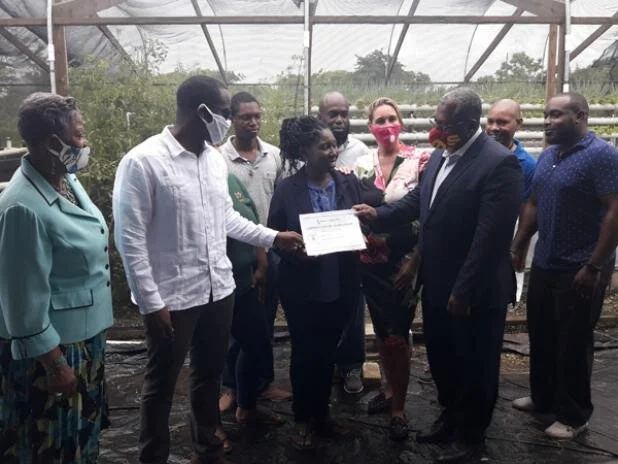
Welcome to iGrow News, Your Source for the World of Indoor Vertical Farming
BARBADOS: Future of Farming: Push For Aquaponics
“It is a great opportunity for farmers and young people who wish to move forward with an innovative and productive form of agriculture,” she expressed, also revealing that the farm currently produces tilapia, specialty lettuce, sweet peppers, tomatoes and a wide range of herbs
From left: Member of Parliament for St Thomas and Minister of People Empowerment and Elder Affairs, Cynthia Forde; Minister of Maritime Affairs and the Blue Economy, Kirk Humphrey; Daledrey Barrow receiving her Certificate of Completion in Aquaponics from Minister of Agriculture and Food Security, Indar Weir. The first training of ten participants at the Aquaponics Demonstration Farm took place pre-COVID .
07/25/20
Barbados can boast of having its own Aquaponics Demonstration Farm at Adams Aquafarm in Hopewell, St. Thomas.
This has been made possible through the collaborative efforts of the Ministry of Maritime Affairs and the Blue Economy and The Food and Agriculture Organization of the United Nations (FAO).
As part of the FAO’s Blue Revolution Project, Adams Aquafarm, owned by Kristina Adams, received funding and training to develop the demonstration farm.
The funding also supports the training of 30 entrepreneurs who are interested in developing an aquaponics small or medium-sized business in Barbados, as well as the training of ten schoolteachers. Aquaponics is the integration of land-based fish farming (aquaculture) and soil-less plant production (hydroponics) with the fish waste providing nutrients for the plants, while the bacteria and plants help to clean the water for the fish.
During the official launch yesterday, Adams said that the funding has allowed her to showcase a farming system that is 100% suited to Barbados while utilizing local supplies and advanced technology to grow local products.
“It is a great opportunity for farmers and young people who wish to move forward with an innovative and productive form of agriculture,” she expressed, also revealing that the farm currently produces tilapia, specialty lettuce, sweet peppers, tomatoes and a wide range of herbs.
Minister of Maritime Affairs and the Blue Economy, Kirk Humphrey said that the project provides great benefits to the country as it supports new and innovative farming opportunities for small-scale and medium-sized businesses.
“In aquaponics, you have the opportunity to have multiple sources of income – your vegetables and fish. You can grow more in smaller spaces, so in a constituency like St. Michael South where I don’t have a lot of space, my people could have the opportunity to make multiple sources of income in a small space. And I understand that the products grow faster and they are organic and uses less energy,” he pointed out.
“Everything about this project excites me and everything about this project is transformative and it puts power back into the hands of ordinary people.”
Minister of Agriculture and Food Security, Indar Weir said that he was impressed, and recalled that when he launched the Farmers’ Empowerment and Enfranchisement Drive (FEED) that he made it clear that many of the young farmers coming into agriculture would have an opportunity to get involved in aquaponics.
“I strongly believe that with the limited land resources that we have in Barbados it is important that we start to understand that the conversation in agriculture is changing. And so therefore when I see a project like this it demonstrates to me that people are out there doing things and not sitting waiting for them to happen.”
Member of Parliament for St Thomas and Minister of People Empowerment and Elder Affairs, Cynthia Forde said that she is extremely proud of what Adams has been able to accomplish.
“I am so proud to see that she has sought to do training. Sometimes we have our ideas and we hold on to them. And I want to say that there is nobody prouder than I am this morning to see a woman at the helm of this initiative. And we really need to let women in agriculture and other aspects of development get the exposure and the credit they deserve,” she stressed.
This Blue Revolution Project is part of a larger effort of FAO to support aquaculture development in the Caribbean. Under the project and the Climate Change Adaptation of the Eastern Caribbean Fisheries Sector Project (CC4FISH), FAO is funding demonstration farms across the Caribbean and continues to promote the adoption of aquaponics techniques and capacity building exercises in the region.
Regional Project Coordinator at FAO - CC4FISH, Iris Monnereau, further emphasized that the agriculture sector in the region needs to be more resilient, more innovative, and more diverse to attract youth and create employment.
“This was already very important before the challenges of COVID-19, but it is especially important now. We are therefore very happy that this project makes a tiny contribution in creating more resilient, diverse and innovative livelihoods in Barbados,” she expressed.(TL)


